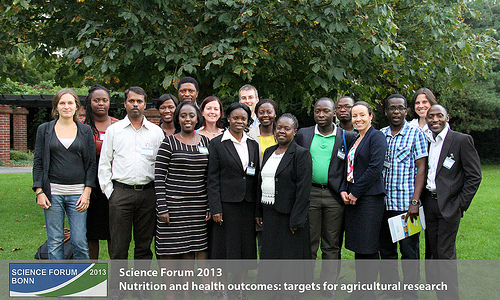-
About
- Our Work
- Get Involved
- Stay Updated

The Science Forum 2013 held during 23-25, September 2013 in Bonn, Germany focused on Nutrition and health outcomes: targets for agricultural research.
The uniqueness of the Forum was the special session for the early career scientists organized by the Independent Science and Partnership Council (ISPC) of the Consultative Group on International Agricultural Research (CGIAR).
Twenty one scientists who are in their early career were invited to the Forum to meet with experts, discuss about the relevant areas of research and also to showcase their work. On the first day of the Forum, the 21 young professionals were introduced to their respective mentors identified by the organizers to discuss about their work and future research relevant to the Forums topics. A dedicated session was organized at the end of the forum for them to discuss further on the relevant research topics identified, and possible ways forward.
In the Early career scientist session, Prof. Linley Chiwona Karltun from Swedish University of Agricultural Sciences delivered an inspirational speech for the sake of the scientists. She asked the scientists to become master in their own discipline and learn various interdisciplinary skills and knowledge too. In her words, its a T approach to success, having a vertical disciplinary knowledge, and horizontally: wide interdisciplinary and communication skills.
In the breakout session, groups formed for early career scientists to present their research proposals. They could seek for expert scientists views and comments. Also, prior to the conference, the 21 young professionals were solicited to submit a proposal to facilitate partnerships among the participants. All of them were asked to register their interest with their preferred partner at the Science Forum. From there, they would potentially have the opportunity of exchange visits to various institutes or labs with respect to their research proposals.
At this conference, there were courteous Student Volunteers who were all the day busy with helping the participants reaching to various venues to participate in the sessions and social gatherings outside the conference venue (Gustav-Stresemann-Institut e.V.). Also some student reporters took interviews, photographs and notes for their blogs. You may enjoy their blogging activity and photographs.
Five of the early career scientists were YPARD members: Zione Kalumikiza (Malawi), Haruna Sekabira (Uganda), Violet Moyo (Malawi), Sridhar Gutam (India), Fardous Mohammad Safiul Azam (Bangladesh). It enabled us to network and discuss further our insights about YPARD and youth activities in our respective countries. You may have a loot at the interviews of Early Career Scientists conducted by Student Reporters.
The Science Forum series has been initiated to reach out to the potentially important scientists and scientific communities who can contribute to the objective of improving food security, human nutrition and health, alleviation of poverty and environmental sustainability. We appreciate the place given to young professionals in this forum, and the capacity building approach brought to the event this year.
More information about the Sience Forum 2013
The Science Forum 2013 was organized by the ISPC in association with the Federal Ministry for Economic Cooperation & Development (BMZ), Germany. It was preceded by the 2011 Science forum on The Agriculture-Environment Nexus at Beijing, China.
The main objective of the Forum was to identify the priority research needs (targets for agricultural research) and to look for new scientific approaches for meeting the nutritional security and well-being in health by facilitating the partnerships among all the communities of agriculture, health and nutrition.
The Forum had started with the keynote plenary on what do we know about nutrition and health outcomes of agriculture? and closed with the plenary on what is the way forward, new research and innovative approaches for impact? And during the three days, the Forum had deliberated in sessions on 1. Under nutrition, 2. Noncommunicable diseases, 3. Diet diversification, 4. Food safety, 5. Policy & institutional approaches and 6. Gender and nutrition. Read the full program, abstracts and presentation videos along with slides, and the summary.
Picture Courtesy: Flickr/Science Forum 2013
About the author
Related Posts
Comments
No comments made yet. Be the first to submit a commentBy accepting you will be accessing a service provided by a third-party external to https://archive.ypard.net/
Get in touch
Email: [email protected]
YPARD Global Coordination UnitHosted by AGRIDEA and the Czech University of Life Sciences Prague
Lausanne, Switzerland and Prague, Czech Republic - Our Work

